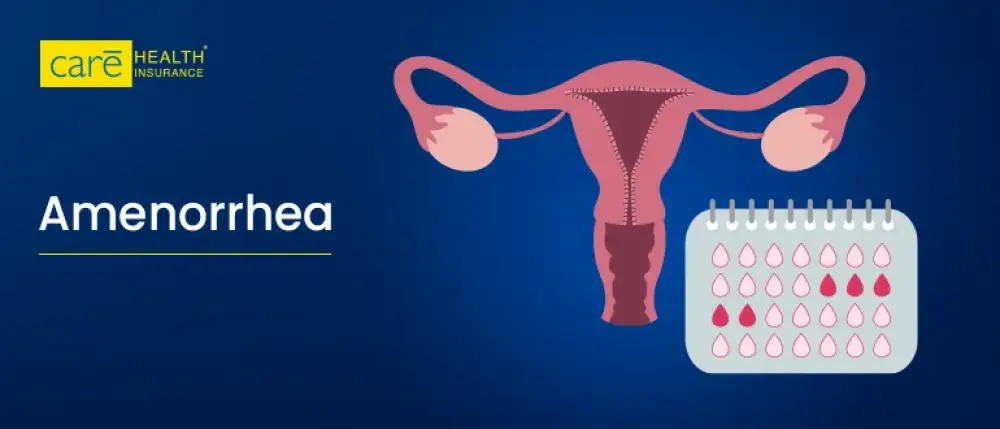Subscribe to get weekly insights
Always stay up to date with our newest articles sent direct to your inbox
Published on 11 Sep, 2025
94 Views
3 min Read

Written by Yash
Reviewed by Ritika Malik
favorite0Like
favoriteBe the First to Like
Nearly 1 in 4 women experience amenorrhea at least once in their lifetime. While missing a period occasionally might not seem alarming, a persistent absence of menstruation, known as amenorrhea, can signal serious health concerns. Amenorrhea is categorised into two types, primary and secondary, and affects women of different age groups for various reasons. In this blog, we will discuss what amenorrhea is, its symptoms, causes, and treatment options.
Amenorrhea refers to the absence of menstruation in women of reproductive age. It is not a disease in itself but a symptom of an underlying condition. Common reasons for amenorrhea include hormonal imbalances, excessive stress, certain medical conditions, and lifestyle factors such as extreme dieting or intense exercise. There are two types of amenorrhea - primary and secondary.
Amenorrhea is of two types: characterised by the absence and by the abnormal stoppage of menstrual cycles in women of reproductive age:
Primary amenorrhea is when someone older than 15 has never gotten their first period despite having other signs of puberty, such as breast development. It typically occurs due to genetic conditions and hormonal imbalances.
Secondary amenorrhea occurs when someone who has been having regular periods stops getting their period for at least three consecutive months or their period stops for six months when they were previously regular. It happens because of many reasons, like pregnancy, stress, and menopause.
Absence of periods is the main symptom that you experience in amenorrhea; other symptoms that you might experience, depending on the cause, are :
Amenorrhea can happen for many reasons. Some are usual, while others may be a side effect of medication or a sign of a medical problem. Let’s understand what the medical reasons are behind amenorrhea.
Primary amenorrhea is when someone older than 15 has never had their first period. Common causes include :
Secondary amenorrhea occurs when someone who has been having regular periods stops getting their period for at least three consecutive months. Common causes include :
Suppose your period stopped because of secondary amenorrhea. In that case, you may not require any treatment, but if it is because of primary amenorrhea, then the healthcare professional might consider the following amenorrhea treatment options:
Managing amenorrhea often requires regular doctor visits, diagnostic tests, and sometimes long-term treatment. That’s where a Comprehensive health insurance plan becomes essential. Having a comprehensive health insurance plan makes sure that expenses for consultations, tests, and treatments are covered, reducing financial stress during recovery.
Although amenorrhea is sometimes disregarded, it is a crucial symptom of a woman's overall health. The lack of menstruation is something that should never be ignored, regardless of the cause, whether it is because of physical issues, hormonal imbalances, or changes in lifestyle. It's about fertility, bone health, and long-term wellbeing, not just about missing your period. Future problems can be avoided, and menstrual health can be effectively restored with early diagnosis, appropriate medical advice, and individualised treatment.
By listening to your body, maintaining a balanced lifestyle, and getting timely care, you can take control of your reproductive health and ensure your body stays in balance. Keep in mind that your menstrual cycle is a sign of your inner wellness and is more than just a monthly event.
Disclaimer: The above information is for reference purposes only. Plan features, benefits, coverage, and underwriting claims are subject to policy terms and conditions. Please refer to the brochure, sales prospectus, and policy documents carefully.
favoriteBe the First to Like
Thyroid : मामूली नहीं हैं महिलाओं में थायराइड होना, जानें इसके लक्षण और घरेलू उपचार Vipul Tiwary in Diseases
शुगर कंट्रोल कैसे करे? जानें, डायबिटीज में क्या खाना चाहिए Vipul Tiwary in Health & Wellness
हाई ब्लड प्रेशर को तुरंत कंट्रोल कैसे करें? देखें इसके उपाय Vipul Tiwary in Diseases
पैरों में दर्द किस कमी से होता है? जानें, इसके घरेलू इलाज Vipul Tiwary in Health Insurance Articles
Neglecting Oral Health and Hygiene? Your Brain Could Suffer the Consequences Jagriti Chakraborty in Mental Health
Unlock Your Health: Protein Powder for Women and Key Supplements Jagriti Chakraborty in Diet & Nutrition
Forget Yoghurt: 8 Probiotic Foods That Actually Work Jagriti Chakraborty in Health & Wellness
BIG Update: Nipah Virus Is Back, Here’s How to Stay Safe! Sejal Singhania in Health Insurance Articles
Yes, PCOS can cause amenorrhea. This occurs because PCOS can disrupt the normal hormonal imbalance and ovulation process, leading to absent or irregular periods.
Amenorrhea is also known as oligomenorrhea
Amenorrhea is a sign of an underlying medical issue. If it is ignored, it can also contribute to other problems, such as low bone density and osteoporosis.
Thyroid problems cause amenorrhea. The thyroid produces hormones that regulate metabolism and play a role in puberty and menstruation.
Missing one menstrual period is rarely a sign of any serious problem or medical condition. Amenorrhea for several months may be a symptom of a disorder or chronic condition that can lead to infertility.
Always stay up to date with our newest articles sent direct to your inbox
Loading...